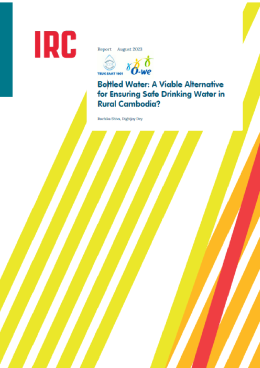RWSN Library

Author
Ruchika Shiva, Digbijoy Dey
Year of Publishing
2023
Publisher
IRC WASH
Institution
Bottled Water: A Viable Alternative for Ensuring Safe Drinking Water in Rural Cambodia?
IRC WASH Case Study
Description:
Access to safe drinking water is a fundamental human right that is recognized by the United Nations and is clearly marked out in the Sustainable Development Goal 6.1. Although significant progress has been made in improving access to clean water globally, rural areas still face a huge challenge in ensuring safe drinking water for their communities.
Given this context, commercial bottled water in certain areas has gained significance as a reliable water source, particularly in underserved regions. However, there are several concerns raised regarding the negative consequences associated with bottled water, such as plastic pollution, resource depletion, and misleading marketing practices.
To discuss these concerns, this paper focuses on a compelling case study of Teuk Saat 1001, a Cambodian NGO established by 1001fontaines. Teuk Saat 1001 has successfully implemented a community-driven bottled water initiative in rural communities. Currently, Teuk Saat 1001 operates a network of over 300 water kiosks, which are small purification units directly set up in underserved rural areas.
Bibliographical Information:
Ruchika Shiva, Digbijoy Dey (2023) Bottled Water: A Viable Alternative for Ensuring Safe Drinking Water in Rural Cambodia?. IRC WASH Case Study , IRC WASH
More Information
DOWNLOADS (14)
Bottled Water: A Viable Alternative for Ensuring Safe Drinking Water in Rural Cambodia?
 Google Übersetzer
Google Übersetzer
